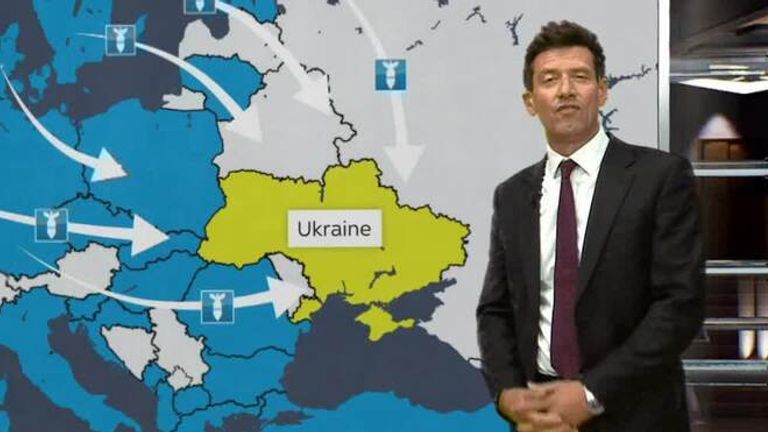Every shop and home burned or ransacked: The Syrian city engulfed in tribal violence
The Syrian presidency has announced it's assembling a special taskforce to try to stop nearly a week of sectarian clashes in the southern Druze city of Sweida.

The presidency called for restraint on all sides and said it is making strenuous efforts to "stop the fighting and curb the violations that threaten the security of the citizens and the safety of society".
The escalation in violence had led to Israel accusing Syrian government forces of perpetrating a massacre against the Druze in Sweida.
Israeli airstrikes which followed killed hundreds of government troops but also civilians.
By early Saturday morning, a ceasefire had been confirmed by the US special envoy for Syria, Tom Barrack, who posted on X that Syrian President Ahmed al Sharaa and Israeli Prime Minister Benjamin Netanyahu had agreed to a ceasefire supported by US secretary of state Marco Rubio.
The post went on to state that this agreement had the support of "Turkey, Jordan and its neighbours" and called upon the Druze, Bedouins, and Sunni factions to put down their arms.
Later, the Syrian presidency announced an immediate and comprehensive ceasefire following the bloodshed in the predominantly Druze area.
Sky News special correspondent Alex Crawford reports from the road leading to Sweida, the city that has become the epicentre of Syria's sectarian violence.
For the past 24 hours, we've watched as Syria's multiple Arab tribes began mobilising in the Sweida province to help defend their Bedouin brethren.
Thousands travelled from multiple different Syrian areas and had reached the edge of Sweida city by Friday nightfall after a day of almost non-stop violent clashes and killings.
"We have come to protect the [Arab] Bedouin women and children who are being terrorised by the Druze," they told us.
Every shop and every home in the streets leading up to Sweida city has been burned or ransacked, the contents destroyed or looted.
We saw tribal fighters loading the back of pickup trucks and driving away from the city with vehicles packed with looted goods from Druze homes.
Several videos posted online showed violence against the Druze, including one where tribal fighters force three men to throw themselves off a high-rise balcony and are seen being shot as they do so.
Doctors at the nearby community hospital in Buser al Harir said there had been a constant stream of casualties being brought in. As we watched, another dead fighter was carried out of an ambulance.
The medics estimated there had been more than 600 dead in their area alone. "The youngest child who was killed was a one-and-a-half-year-old baby," one doctor told us.
The violence is the most dangerous outbreak of sectarian clashes since the fall of the Bashar al Assad regime last December - and the most serious challenge for the new leader to navigate.
What led to outbreak of violence
A civil war raged in Syria for nearly 14 years before Bashar al Assad was ousted in December last year. Ahmad al Sharaa, who led Islamist rebels who overthrew the authoritarian leader, became the country's interim president in a transition that was initially mostly peaceful.
But a few months later, government forces clashed with pro-Assad armed groups on Syria’s coast, spurring sectarian attacks that killed hundreds of civilians from the Alawite religious minority to which the former president belongs. The violence left other minority groups, including the Druze in the south, and the Kurds in the northeast, increasingly mistrustful of the new government and worried whether it would protect them.
Deadly clashes broke out last Sunday in the southern province of Sweida between Druze - a religious sect with roots in Ismailism, a branch of Shiite Islam - militias and local Sunni Muslim Bedouin tribes. Government forces intervened, ostensibly to restore order, but ended up trying to wrest control of Sweida from the Druze factions that control it, with hundreds killed in the fighting.
Israel intervened on behalf of the Druze, who are seen as a loyal minority within Israel and often serve in its military, striking government targets in Damascus and Sweida. By Wednesday, a truce had been negotiated, allowing Druze factions to maintain security in Sweida as government forces pulled out, although fighting between Druze and Bedouin forces continued.
US special envoy to Syria Tom Barrack announced a separate ceasefire had been brokered between Israel and Syria on Saturday, hours before Syria’s internal security forces began deploying to Sweida.
The newly brokered deal is aimed at ending the sectarian killings and restoring some sort of stability in a country which is emerging from more than a decade of civil war.
-SKY NEWS






